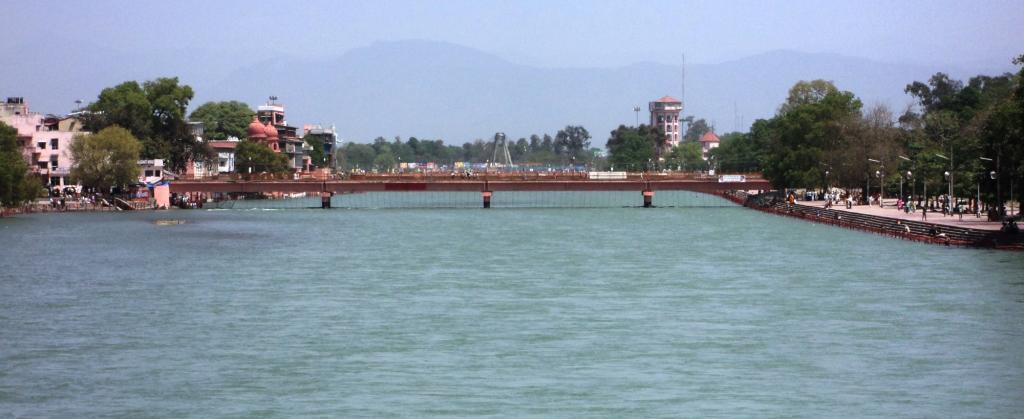A project that aims to improve the health of the Ganges, India’s holy river, is among 10 ”ground-breaking” efforts recognised from around the globe by the United Nations for their role in restoring the natural world, according to a report unveiled on Tuesday during the UN Biodiversity Conference (COP15) here.
The initiatives were declared World Restoration Flagships and are eligible to receive UN-backed promotion, advice or funding.
They were selected under the banner of the United Nations Decade on Ecosystem Restoration, a global movement coordinated by the UN Environment Programme (UNEP) and the UN Food and Agriculture Organisation (FAO).
It is designed to prevent and reverse the degradation of natural spaces across the planet, the UN said.
Together, the 10 flagships aim to restore more than 68 million hectares — an area bigger than Myanmar, France or Somalia — and create nearly 15 million jobs, the UN said.
“Transforming our relationship with nature is the key to reversing the triple planetary crisis of climate change, nature and biodiversity loss, pollution and waste,” said UNEP Executive Director Inger Andersen.
7th India Water Impact summit to begin on Dec 15 to deliberate on conservation of small rivers
“These 10 inaugural World Restoration Flagships show that with political will, science and collaboration across borders, we can achieve the goals of the UN Decade of Ecosystem Restoration and forge a more sustainable future not only for the planet but also for those of us who call it home,” Andersen said here.
In the Ganges River Rejuvenation project, restoring the health of the Ganges is the focus of a major push to cut pollution, rebuild forest cover, and bring a wide range of benefits to the 520 million people living around its vast basin, the UN said in a statement.
Climate change, population growth, industrialisation, and irrigation have degraded the Ganges along its arcing 2,525-kilometre course from the Himalayas to the Bay of Bengal, it said.
“Launched in 2014, the government-led Namami Gange initiative is rejuvenating, protecting and conserving the Ganges and its tributaries, reforesting parts of the Ganges basin and promoting sustainable farming,” according to the statement.
The project also aims to revive key wildlife species, including river dolphins, softshell turtles, otters, and the hilsa shad fish.
The initiative, with an investment of up to USD 4.25 billion so far, has the involvement of 230 organisations, with 1,500 km of river restored to date.
Additionally, there have been 30,000 hectares of afforestation so far, with a 2030 goal of 134,000 hectares, according to the UN.
The other inaugural World Restoration Flagships include the Trinational Atlantic Forest Pact, which aims to protect and restore the forest in Brazil, Paraguay and Argentina, and the Abu Dhabi Marine Restoration project which is safeguarding the world’s second-largest dugong population in Abu Dhabi.
The Great Green Wall for Restoration and Peace initiative to restore savannas, grasslands and farmlands across Africa, the Multi-Country Mountain Initiative based in Serbia, Kyrgyzstan, Uganda and Rwanda, and the Small Island Developing States Restoration Drive focused on three small island developing states – Vanuatu, St Lucia and Comoros were also recognised.
The Altyn Dala Conservation Initiative in Kazakhstan to restore the steppe, semi-desert and desert ecosystems, the Central American Dry Corridor, and Shan-Shui Initiative in China were the other projects on the list.
In revealing the World Restoration Flagships, the UN Decade seeks to honour the best examples of large-scale and long-term ecosystem restoration, embodying the 10 Restoration Principles of the UN Decade on Ecosystem Restoration.
The UN Decade acknowledges the time needed for restoration efforts to deliver results.
Until 2030, regular calls for World Restoration Flagships will be launched.
In expectation of increased funding to the UN Decade’s Multi-Partner Trust Fund (MPTF), additional submissions are being considered, including restoration drives from Pakistan, Peru, and an initiative focusing on Somalia and other drought-affected countries.
Leaders and negotiators from 196 countries, including India, gathered here in Canada for a two-week conference expected to adopt a landmark agreement to halt and reverse nature loss by 2030.
During the UN Biodiversity Conference (COP15) being held from December 7 to 19, about 20,000 delegates from across the world will negotiate an eight-year plan to preserve and restore biodiversity.
They will do so through the Convention on Biological Diversity, a treaty adopted for the conservation and sustainable use of biological diversity and related issues.

















